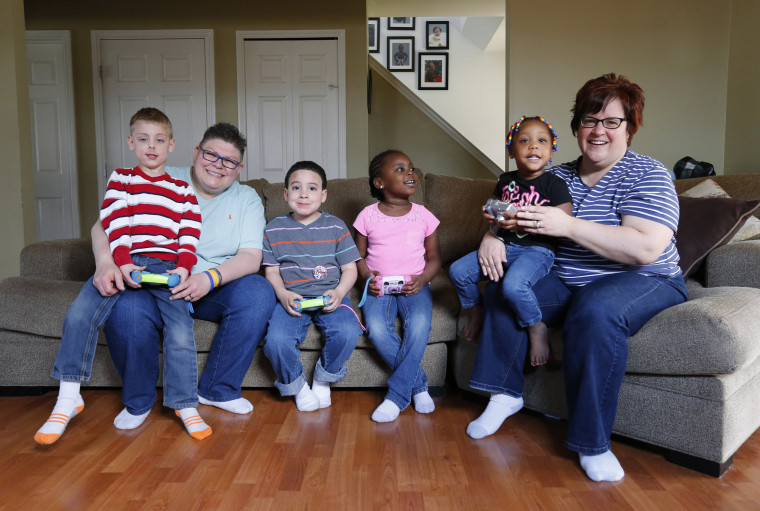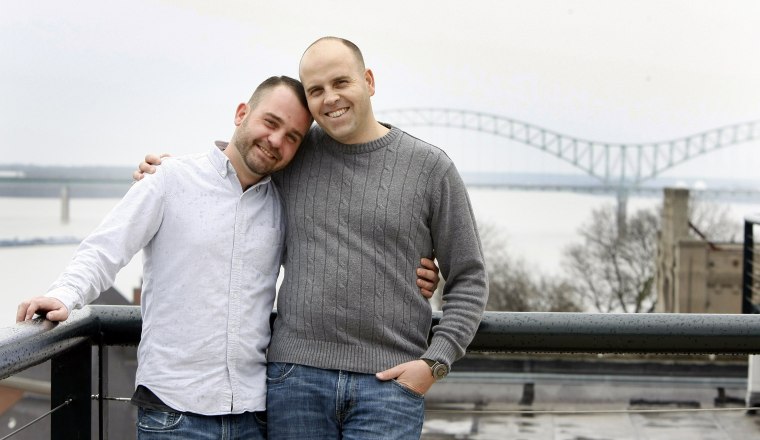The contentious issue of marriage for same-sex couples comes to the U.S. Supreme Court on Tuesday — the first big legal showdown of its kind since laws against interracial marriage were struck down almost 50 years ago.
The court has set aside an unusually long time for courtroom argument — two and a half hours — and will release an audio recording later in the day.
The case "is about the fundamental question of how our democracy resolves debates about social policy," argues Michigan Attorney General Bill Schuette.
"The people, not the courts, have the right to define marriage," he said.
But advocates for same-sex couples say the courts must step in when fundamental rights are in jeopardy.
"The states don't have the right to violate the constitutional rights of individuals. And that includes same-sex couples who want the freedom to marry," said James Esseks of the American Civil Liberties Union.
Nationwide, popular sentiment is on the side of gay couples, with a clear majority of Americans supporting same-sex marriage rights — 59 percent in the latest NBC News/Wall Street Journal poll. A total of 36 states now permit it.
But in 25 of them, the outcomes were determined by judges, not by legislatures or voters. A total of 17 states have filed friend-of-court briefs arguing that they, not the federal courts, should determine who can marry whom.
Nineteen other states are urging the Supreme Court to declare the state bans unconstitutional.
"The bans cannot be reconciled with the fundamental constitutional guarantee of equal protection of the laws"
The justices have agreed to answer two questions about the authority of the states: Can they refuse to give marriage licenses to gay couples? And can they decline to recognize the marriages of same-sex couples that were legally granted somewhere else?
Among those challenging the bans on licensing are two Michigan nurses, Jayne Rowse and April DeBoer. Each adopted two children, some with special needs, but they want to get married so both can be legally recognized as parents to all the children, in case something should happen to either of them.
"That's what really scared us the most, the possibility that they could be ripped apart and not see each other again," Rowse said.
Their interest in the issue isn't a political or religious one, DeBoer said. "We don't want to change the world, we just want to change this. We want to do the simplest things in life for our kids."

Thomas Kostura and Ijpe DeKoe are among the couples challenging the ban on recognition. They decided to get married four years ago in New York as DeKoe, a U.S. Army sergeant, was about to deploy to Afghanistan.
When the Army later ordered a move to Memphis, the state of Tennessee refused to consider their marriage legally valid.
"We're not blind to what the laws were in Tennessee," DeKoe says. "But being in the military, you really can't say 'I don't want to go there.'"
Adds Kostura, "When two people love each other, they make commitments to each other. And those commitments should be respected and should travel from state to state."

Four federal appeals courts have struck down state bans, but the 6th U.S. Circuit Court of Appeals, based in Cincinnati, upheld laws banning marriage for gay couples in Kentucky, Michigan, Ohio, and Tennessee.
Those states argue that preserving traditional marriage promotes family stability and encourages opposite-sex couples — who can produce children — to get married.
But gay rights advocates say allowing same-sex couples to marry would have no effect on the appeal of marriage to others.
Granting marriage licenses to gay couples "in no way affects any of the already existing incentives for opposite-sex couples to marry," Mary Bonauto, an attorney with the Gay & Lesbian Advocates & Defenders, said.
The Obama administration is urging the court to find the state bans unconstitutional, arguing that they "impermissibly exclude lesbian and gay couples from the rights, responsibilities, and status of civil marriage."
Submitted by Solicitor General Donald Verrilli, the government's brief says the state laws "impose concrete harms on same-sex couples and send the inescapable message that same-sex couples and their children are second-class families, unworthy of the recognition and benefits that opposite-sex couples take for granted.
"The bans cannot be reconciled with the fundamental constitutional guarantee of equal protection of the laws," the breif reads.
The issue comes to the justices after a cascade of court rulings invalidated marriage bans in one state after another. Nearly 60 separate decisions in more than half the states have been issued in the past 20 months.
"The people, not the courts, have the right to define marriage,"
Nearly all of them cited a U.S. Supreme Court ruling from two years ago. That ruling struck down a law passed by Congress that blocked the federal government from recognizing same-sex marriages in the states that allowed them.
The ruling, in a case called U.S. v. Windsor, said the federal law served no legitimate government purpose and demeaned those in legal same-sex marriages by declaring their relationships less worthy.
States supporting the marriage bans say Windsor affirmed that they, and not the federal courts, get to decide which of their residents can get married.
But gay rights advocates say the Windsor ruling means it's just as wrong for states to demean same-sex couples as it was for Congress.
If the gay couples win the current dispute, marriage for same-sex couples would become legal nationwide. If the states win, the nation would remain divided, with some states choosing to permit it and others banning it.
A decision is expected by late June.
